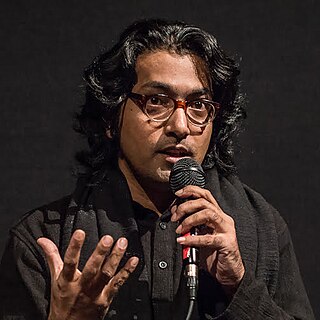The cinema of the United Arab Emirates began with a number of feature films that were broadcast on national television since the late 1980s.

Sharmeen Obaid-Chinoy is a Pakistani-Canadian journalist, filmmaker and activist known for her work in films that highlight the inequality with women. She is the recipient of two Academy Awards, seven Emmy Awards and a Knight International Journalism Award. In 2012, the Government of Pakistan honoured her with the Hilal-i-Imtiaz, the second highest civilian honour of the country and the same year Time magazine named her one of the 100 most influential people in the world. She holds the record for being the first female film director to have won two Academy Awards by the age of 37.

The International Film Festival of the Art of Cinematography Camerimage is a festival dedicated to the celebration of cinematography and recognition of its creators, cinematographers. The first seven events (1993–1999) were held in Toruń, Poland. The next ten events (2000–2009) were held in Łódź. From 2010 until 2018 the festival has taken place in Bydgoszcz, before returning to Toruń in 2019, where it currently remains. In 2007, the name of the festival was changed from Camerimage to Plus Camerimage but was changed back in 2013 after the sponsorship deal with Plus ended. At the end of November every year, Camerimage brings together professional cinematographers, students and other people associated with the film industry. The Camerimage festival spans over a course of one week, with multiple events at one time.

Suroosh Alvi is a Canadian journalist and filmmaker. He is the co-founder of Vice Media, a digital media and broadcasting brand that operates in more than 50 countries. Alvi is a travelled journalist and an executive producer of film, covering youth culture, news, and music globally. He has hosted and produced documentaries investigating controversial issues, armed conflicts, movements, and subcultures, including conflict minerals in the Democratic Republic of the Congo, the Iraq War, the takeover of Gaza by Hamas in the Israeli–Palestinian conflict, and the rise of the Pakistani Taliban and global terrorism.

Marshall Curry is an Oscar-winning American documentary director, producer, cinematographer and editor. His films include Street Fight, Racing Dreams, If a Tree Falls: A Story of the Earth Liberation Front, Point and Shoot, and A Night at the Garden. His first fiction film was the Academy Award-winning short film The Neighbors' Window (2019).
Alpavirama is a biennial film festival organised by the Department of Film and Video Communication at the National Institute of Design, Ahmedabad, India. The first edition of the festival was held in 2011 as a South Asian Short and Documentary Film Festival. Its subsequent editions, held in 2014, 2016 and 2018, retained its South Asian focus. Alpavirama 2020 was held online owing to the Covid-19 Pandemic, and it invited short fiction and documentary films by filmmakers from the Global South.

Ammar Aziz is a Pakistani documentary filmmaker and poet. He's a recipient of the International Federation of Film Critics Award. His debut feature length film A Walnut Tree had its world premiere at IDFA and North American premiere at Hot Docs. The film won awards for the best film from Film SouthAsia, Moscow International Documentary Film Festival, Sole Luna Doc-Film Festival and others. His Second feature film, Discount Workers, had world premiere at One World Film Festival and opened a film festival in Kolkata
Beena Sarwar is a Pakistani journalist, artist and filmmaker focusing on human rights, gender, media and peace. She is currently the Pakistan Editor of the Aman ki Asha initiative, that aims to develop peace between the countries of India and Pakistan. The initiative is jointly sponsored by the Jang group in Pakistan and the Times of India across the border.
Biju Toppo is an anthropological and national award-winning tribal documentary filmmaker from Ranchi, Jharkhand. He uses film as a medium for social activism on behalf of marginalized indigenous communities, and teaches video production at St. Xaviers College, Ranchi, Jharkhand, India. He belongs to the ethnic group Kurukh of India.

The Look of Silence is a 2014 internationally co-produced documentary film directed by Joshua Oppenheimer about the Indonesian mass killings of 1965–66. The film is a companion piece to his 2012 documentary The Act of Killing. Executive producers were Werner Herzog, Errol Morris, and Andre Singer. It was nominated for the Academy Award for Best Documentary Feature at the 88th Academy Awards.
Adnan Malik is a Pakistani film and television actor, director, and producer under his own company's banner, AMP. He is also WWF Pakistan's goodwill ambassador and an Asia Society, Asia 21 Fellow and Young Leader of the World. Malik has also served on the board for the Citizen's Archive of Pakistan.

He Named Me Malala is a 2015 American documentary film directed by Davis Guggenheim. The film presents the young Pakistani female activist and Nobel Peace Prize laureate Malala Yousafzai, who has spoken out for the rights of girls, especially the right to education, since she was very young. The film also recounts how she survived and has become even more eloquent in her quest after being hunted down and shot by a Taliban gunman as part of the organization's violent opposition to girls' education in the Swat Valley in Pakistan. The title refers to the Afghani folk hero Malalai of Maiwand, after whom her father named her.

Every Good Marriage Begins with Tears is a 2006 British documentary film produced, directed and written by Simon Chambers. The film is about two sisters born and raised in London in the traditions of their native Bangladesh, going through the process of arranged marriages to men chosen by their parents.

Kamar Ahmad Simon is a new generation Bangladeshi filmmaker whose works centre existential themes of the subaltern and style challenges the border between fiction and non-fiction. Kamar came to fame with his critically acclaimed debut ‘Are You LIstening!’ for which he won the Grand Prix at Cinéma du Réel at the Centre Pompidou in Paris and Golden Conch at the Mumbai International Film Festival. ‘Are You Listening!’ was also the curtain-opener of Locarno Open Doors Screening and Dok-Leipzig in Germany. Kamar was featured as the red carpet Director at Locarno Piazza Grande after winning the best project award in Locarno Open Doors Hub for the 2nd part of the water trilogy ‘Day after…’, which was in the main international competition of IDFA 2021. It was also invited to La Atelier Cinéfondation of Cannes where only the organizers reserve the right to invite the upcoming very best of world cinema. Kamar received WCF from Berlinale for his upcoming feature ‘Iron Stream’.’ La Bibliothèque publique d’information (BPI) France, Johns Hopkins University USA has acquired his film and Royal Anthropological Institute of Great Britain and Ireland (RAI) have exhibited his work.
Jeevika: Asia Livelihood Documentary Festival is an annual documentary festival started in January 2004 by Centre for Civil Society. The festival is a part of their Jeevika Campaign which advocates for livelihood freedom for street entrepreneurs. The festival showcases documentaries based on the issue of livelihood, to capture the challenges faced by the rural and urban poor by bringing them to the attention of the public.
Balochi cinema refers to the Balochi-language film industry in Pakistan, Iran, and among the Baloch diaspora.

Mohammad Hossein Mahdavian is an Iranian film director and screenwriter. He's best known for his films Standing in the Dust (2016), Midday Adventures (2017), Lottery (2018), Walnut Tree (2020) and Mortal Wound (2021).

Mohammed Ali Naqvi is a Pakistani filmmaker based in New York City. He is known for documentaries which shed light on the socio political conditions of Pakistan, and feature strong characters on personal journeys of self-discovery. Notable films include Insha’Allah Democracy (2017), Among the Believers (2015), Shame (2007), and Terror’s Children (2003).
Surabhi Sharma is a filmmaker, educator and curator. based in Mumbai. India She has worked on several feature-length documentaries apart from some short fiction films and video installations. Her key concern has been documenting cities in transition through the lens of labour, music and migration, and most recently reproductive labour. Cinema verite and ethnography are the genres that inform her filmmaking.,
Cinema of Sudan refers to both the history and present of the making or screening of films in cinemas or film festivals, as well as to the persons involved in this form of audiovisual culture of the Sudan and its history from the late nineteenth century onwards. It began with cinematography during the British colonial presence in 1897 and developed along with advances in film technology during the twentieth century.











